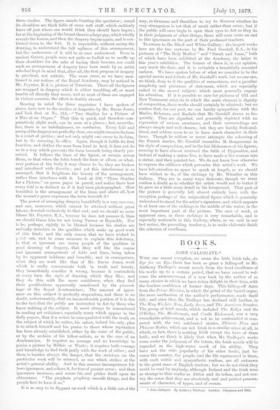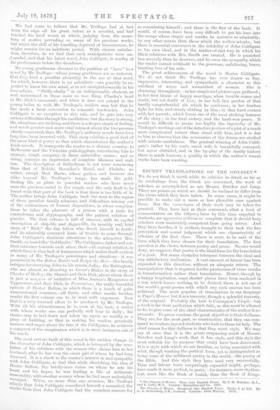BOOKS.
JOHN CALDIGA.TE.*
WITH one recent exception, we mean the little Irish tale, An Eye for an Eye, there has been so great a falling-off in Mr. Anthony Trollope's recent novels from the level excellence of his works up to a certain period, that we have ceased to wel- come the announcement of a new book by the author of so many stories in which we have taken delight in their time, with the fearless confidence of former days. This falling-off dates from the Prime Minister, in which the grind of the barrel-organ, the mere mechanism of the author's performance, made itself felt ; and since then Mr. Trollope has declined still farther, in The Way We Live -Now, Lady Anna, and The American Senator. The group of Irish novels, which included The Kellys and the O'Kellys, The Macclormots, and Castle Richmond, was a very remarkable achievement, and is not to be confounded or com- pared with the two celebrated stories, Phineas IN1111, and Phineas Reduce, which are not Irish in a similar sense at all, in which, in fact, there is nothing Irish except the hero of them both ; and we think it likely that when Mr. Trollcpe's works come under the judgment of the future, the Irish novels will be regarded as the high-water mark of his ability. They have not the wide popularity of his other books, just be- cause the country, the people, and the life represented in them, with such subtle and sympathetic realism, are all unknown to the great mass of English readers ; but we do not think they could be read by anybody, although Ireland and the Irish were as strange to that reader as Africa and its tribes, and not con- vey the sense that they are absolutely real and perfect present- ments of character, of types, and of events.
* John Caldigate. By Anthony Trollopo. London Chapman and Hall. We had come to believe that Mr. Trollope had at last worn the edge off his great talent as a novelist, and had reached his level worst, at which, judging from the mono- tony of motive pervading so many of his previous works, but which the skill of his handling deprived of tiresomeness, he might• remain for an indefinite period. With sincere satisfac- tion, therefore, do we find that such anticipations wore un- .f minded, and that his latest novel, john Caldigate, is worthy of its predecessors before the decadence.
No young gentleman elevated to the position of " hero " to a novel by Mr. Trollope—whose young gentlemen are so unheroic.
that they lend a peculiar absurdity to the use of that word, for which, however, there is no substitute—can possibly be ex- peeled' to know his own mind, or to act straightforwardly in his love-affairs. " " is an indispensable element, as well understood in these eases as was King Charles's head in Mr. Dick's memorial ; and when it does not extend to the young ladies as well, Mr. Trollope's readers may feel that he
has made a large concession to romantic tendencies. John Caldigate is no exception to this rule, and he gets into very serious difficulties through his vacillation; but the story is strong, the situations are striking, and there is a deeper strain of feeling, and much greater and more vital interest about the two persons chiefly concerned, than Mr. Trollope's ordinary novels have for a long time been invested with. This story exhibits a good deal of the same kind of power as that which characterises the author's Irish novels. It transports the reader to a distant country, to Melbourne and the Victorian gold-diggings, introducing him to strange, rough company, in those unfamiliar scones ; and so doing, conveys an impression of complete likeness and real- ism. The description of Ballycloran is not more convincing than that of Nobble, Henniker's Hotel, and Ahalaht; no writer, except Bret Harte, whose pathos and humour are alike beyond Mr. Trollope's range, has made the gold- finding life so plain to peaceful readers who have never seen the precious metal in the rough, and the only fault to be found with that part of the book is that there is too little of it. The author brings John Caldigate back too soon to the region of those peculiar family relations, and difficulties, arising out of the contrariness of human dispositions, in whose complica- tions he takes the pleasure of a person with a taste for conundrums and cl.yptography, and the patient solution of puzzles. The first volume is full of interest, with its capital description of ship-life and digger-life, its terribly real, brief story of "Mick," the fine fellow who drank himself to death ; and its admirably conveyed hints of trouble to come through John Caldigate's obstinate attentions to the attractive Mrs. Smith, on board the Goldfinder.' The Caldigates, father and sou, their reticence towards each other, their odd mutual relation, in which there is that lack of humanness which makes itself evident in many of Mr. Trollope's personages and situations—it was prominent in the Belton Estate and Ralph the Heir—the family intrigue for marrying John to his cousin Julia; the Babingtons, who are almost as diverting as Lever's Blakes in the story of Charles 0.3falley ; the Shawls and their Dick, about whom there is just a soupcon of imitation of Miss Austen's Kusgroves of Uppercross, and their Dick, in Persuasion; the really beautiful episode of Hester Bolton, in which there is a touch of quite unaccustomed romance,—all these, and other merits besides, render the first volume one to be read with eagerness. Now that is a very unusual effect to be produced by Mr. Trollope, 'With all his attractiveness, ho is, oven at his best, a writer with whose works one can perfectly well bear to daily; his stories may be laid down and taken up again as readily as a piece of knitting, so that in making his readers genuinely anxious and eager about the fate of the Caldigates, he achieves a conquest of the imagination which is in Most instances out of his reach.
The most serious fault of this novel is the sudden change in the character of John Caldigate, which is betrayed by the reve- lation of his relations with the woman who claims him as her husband, after he has won the sweet girl of whom he had long dreamed. It is a shock to the reader's interest in and sympathy with John Caldigate, to find that while cherishing the idea of Rester Bolton, the briefly-seen vision on whom he sets his heart and his hopes, he was leading a life of deliberate immorality, with another woman whom he had most undeniably Wronged. When, on more than one occasion, Mr. Trollope admite that John Caldigate considered himself a scoundrel, the reader feels that John Caldigate had the soundest reasons for
so considering himself ; and there is the flaw of the book. It would, of course, have been very difficult to get his hero into the scrape whose stages and results he narrates so admirably, by any other means than those which the author adopts ; but there is essential coarseness in the infidelity of John Caldigate to his own ideal, and in the matter-of-fact way in which his illicit relations with Mrs. Smith are treated. He is punished less severely than he deserves, and. he owes the sympathy which the reader cannot withhold to the generous, unfaltering,hrave, trusting love of his wife.
The great achievement of the novel is Hester Caldigate. We do not think Mr. Trollope has ever drawn so fine, impressive, interesting, and sympathetic a character as this wifeliest of wives and womanliest of women. She is charming throughout,—in her simple and picturesque girlhood ; in her first bloom of happy marriage, when trouble comes and doubt, but not doubt of him; in her full, free pardon of that hardly comprehended sin which he confesses ; in her fearless fight for him, and steady abiding by him ; in that hard contest with her parents, which forms one of the most striking features of the story ; in the final victory, and the hard-won peace. It would be difficult to praise too highly the ingenuity of Mr. Trollope's working-out of the detective portion of a plot of a much more complicated nature than usual with him, and it is due to him to observe that the accessories of the drama are studied with minute carefulness. The gradual winning of John Caldi- gate's father by his son's sweet wife is beautifully conveyed, but never obtruded, and in the by-play of the family history there is much humour, a quality in which the author's recent works have been wanting.



































 Previous page
Previous page